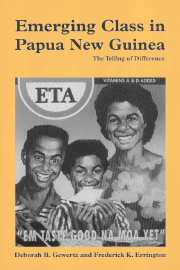Book contents
- Frontmatter
- Contents
- List of illustrations
- Acknowledgments
- Introduction: the twists and turns of difference
- 1 The middle class the (new) Melanesian way
- 2 How the grass roots became the poor
- 3 The realization of class exclusions
- 4 The hidden injuries of class
- 5 The problem(s) of the poor
- 6 Class and the definition of reasonability
- Conclusion: on dark nights of the soul
- Notes
- References
- Index
3 - The realization of class exclusions
Published online by Cambridge University Press: 03 December 2009
- Frontmatter
- Contents
- List of illustrations
- Acknowledgments
- Introduction: the twists and turns of difference
- 1 The middle class the (new) Melanesian way
- 2 How the grass roots became the poor
- 3 The realization of class exclusions
- 4 The hidden injuries of class
- 5 The problem(s) of the poor
- 6 Class and the definition of reasonability
- Conclusion: on dark nights of the soul
- Notes
- References
- Index
Summary
Golf and the redrawing of boundaries of sociality
In the last two chapters, we showed that the consumption-oriented sociality through which relatively affluent Papua New Guineans were defining their identities and interests was importantly realized in contexts of mostly imported activities and organizations. Rotary provided one such context. SWIT, substantially through its affiliation with OPT, provided another. In particular, we saw that membership in both Rotary and SWIT furnished those of the middle class with their justification for seeking a good life in which they could, with equanimity, attend to their own affairs without being continually wrenched by the claims of grass-roots kin for financial help. Golf provided a third such context of sociality. It was at the Wewak Resort and Country Club where we found clearly instantiated and recognized a key constellation of the processes constituting middle-class life worldwide: commodity consumption by individuals within nuclear (or, at the broadest, nucleated) families. And it was around the margins of this context of sociality provided by Wewak's golf club that we found this constellation to be especially clearly, if unsuccessfully, challenged.
Preliminaries: on golf and the good life
An active, almost evangelical, promotion of these worldwide processes constituting middle-class life (those that were coming Wewak's way at the margins of the “developing” world) came our way (at the center of “development”) in a recent New York Times article (Sandomir, 1997: D1 and 8). This was about Tiger Woods, 21-year-old golfer extraordinaire. Not only was Woods a thoroughly multicultural hero (self-designated as “Cablinasian” – part Caucasian, Black, American Indian, Chinese and Thai), but he owed much of his success as a golfer to direct and positive parental influence.
- Type
- Chapter
- Information
- Emerging Class in Papua New GuineaThe Telling of Difference, pp. 60 - 83Publisher: Cambridge University PressPrint publication year: 1999

